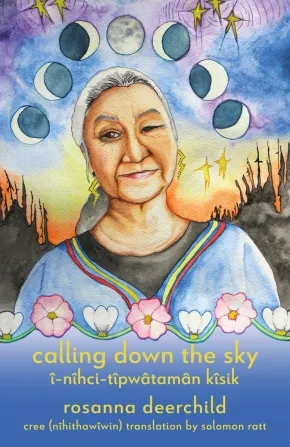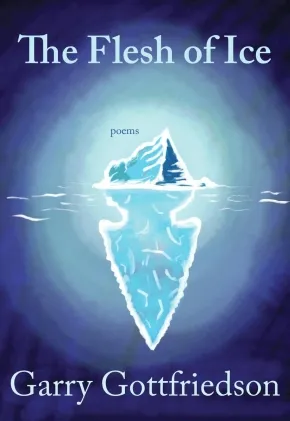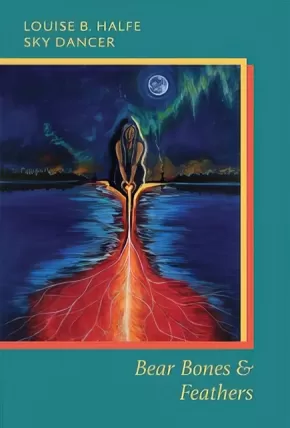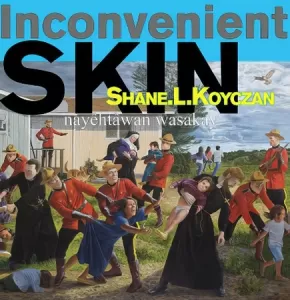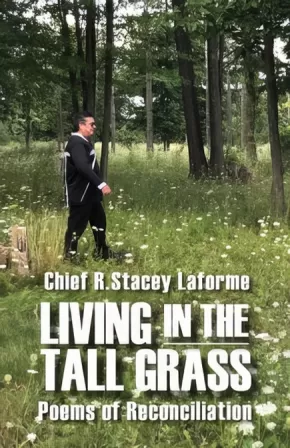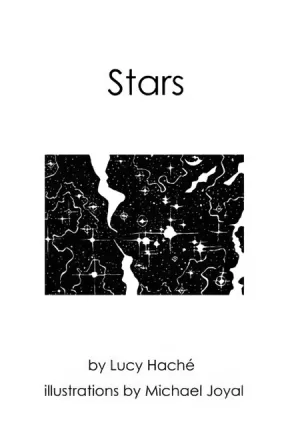
Poetry
1
-
8
of
8 Results;
Sort By
Calling Down the Sky: Tenth Anniversary Edition
$24.95
Text Content Territories:
Indigenous Canadian; Métis; Inuit; First Nations;
ISBN / Barcode: 9781552455159
Synopsis:
Synopsis:
A tenth anniversary bilingual edition in English and Cree of Rosanna Deerchild’s stunning collection about the intergenerational impacts of the Canadian residential school system.
you want me to
share my story
ok then
here it is
here in the unwritten
here in the broken lines
of my body that can never forget
In Calling Down the Sky, poet Rosanna Deerchild viscerally evokes her mother’s experience within the residential school system, the Canadian government’s system of violently removing Indigenous children from their homes, families, and languages in an explicit attempt to destroy Indigenous cultures and identities. With precise and intricate poetry, Deerchild weaves together the story of her mother’s childhood and Deerchild’s memories of her mother: her love of country music, her attempts to talk about what happened to her, how tightly she braided her daughter’s hair on the first day of school. In doing so, Deerchild illustrates the disruptive and devastating impacts of the residential school system on generations of families while also celebrating the life and culture of her mother and other survivors.
Published for the first time in a bilingual edition of Cree and English, in time for the tenth anniversary of the original publication, Calling Down the Sky is an intimate and gorgeously evoked reckoning with a horrifying part of North American history.
Reviews
“Rosanna Deerchild’s poems roll off the tongue as easy as old country songs. With her deft hand, Deerchild finely tunes every word and weaves them together as intimately as she braids her girls’ hair. Together, these poems create a story that sings with beautiful tension, amazing resilience, and love as big as the sky." - Katherena Vermette, Métis Writer
"The poetry collection, called calling down the sky, describes personal experiences with the residential school system in the 1950s and the generational effects it had." - CBC
"This poetry collection is fierce, raw and candid. It is also visceral, intricate and, above all, illuminating. By recounting her mother’s residential school experience in a powerfully poetic narrative, Deerchild expertly illustrates the heartbreaking trauma of that tragic saga and how it complicates relationships over generations. By beautifully and elaborately exploring those relationships and that devastating history, she finds and celebrates the resilient and hopeful spirit that many residential school survivors, like her mother, have managed to retain in the face of horror and torment. As a result, calling down the sky is an essential read in understanding the true modern history of this land and in honouring the people who survived it.” - Waubgeshig Rice
Educator Information
Bilingual: English and Cree
Additional Information
96 pages | 5.50" x 8.50"
The Flesh of Ice
$20.00
Format:
Paperback
Text Content Territories:
Indigenous Canadian; First Nations; Salish; Interior Salish; Secwepemc (Shuswap);
Reading Level: N/A
ISBN / Barcode: 9781773861579
Synopsis:
Synopsis:
The Secwépemc term le estcwicwéy̓ (the missing) was given by Secwépemc elders who dedicated their knowledge and time to guide the community through the hell they were forced to endure in May 2021. Garry Gottfriedson’s The Flesh of Ice picks up the thread of his 2021 collection, Bent Back Tongue, describing the history and relationship of Indigenous people in Canada with the Canadian government and the Catholic church. Here is the story of those who survived Kamloops Indian Residential School (KIRS), and stories of descendants of KIRS who remembered "the missing” in the wake of the discovery of unmarked graves at the KIRS. Here, in hauntingly visceral poems, are the living conditions, policies and practices of the school itself, the stories of those who lived there, and the names of practitioners of the school, called out and cursed. Lastly, personal stories are given space to reclaim the narrative, taking readers on a journey of resilience, survival, pain and joy.
Reviews
"Drawing on the work of the late legal scholar Patricia Monture-Angus, I find fitting words for this book and for the former students of KIRS: first we were victims, then we were survivors and now we are warriors. Those warriors have now become teachers—teachers for those who learn to listen to the voices in this book."—from the prologue by Celia Haig-Brown
Additional Information
126 pages | 5.50" x 8.00" | Paperback
acâhkos nikamowini-pîkiskwêwina?: nêhiyawi-kîsik âcimowin? The Star Poems: A Cree Sky Narrative
$24.95
Format:
Paperback
Text Content Territories:
Indigenous Canadian; First Nations; Cree (Nehiyawak);
ISBN / Barcode: 9781778690174
Synopsis:
Synopsis:
Aided by Grandmother Spider, Star Woman discovers the Hole-in-the-Sky, opening a pathway for the Star People to experience the wonder of life on earth. But the world falls into the hands of the Paper People, jeopardizing the sacred harmony between nature and the cosmos. And so Little Spirit, a young boy, must search for meaning and find redemption in the care of Grandmother Moon.
An epic narrative, The Star Poems explores the black hole of colonial history—Residential Schools, the loss of the father, youth suicide—and the vital role of women in reclaiming our traditional knowledge, the teachings that stitch together the fabric of the universe.
The Star Poems creatively engages Cree oral tradition in a new way, connecting Indigenous spirituality and quantum physics to honour and adapt some of our most ancient stories about the origins of life and our place in the universe. Presented in both English and Cree, The Star Poems is a timely contribution to the revitalization of the Cree language—and the fascinating world of star stories.
Educator Information
Recommended for ages 15+
Additional Information
132 pages | 6.00" x 9.00" | Paperback
Bear Bones and Feathers
$20.00
Format:
Paperback
Text Content Territories:
Indigenous Canadian; First Nations; Cree (Nehiyawak); Plains Cree; Saddle Lake Cree Nation ;
Reading Level: N/A
ISBN / Barcode: 9781771315784
Synopsis:
Synopsis:
In this new edition of her powerful debut, Plains Cree writer and National Poet Laureate Louise B. Halfe - Sky Dancer reckons with personal history within cultural genocide.
Employing Indigenous spirituality, black comedy, and the memories of her own childhood as healing arts, celebrated poet Louise B. Halfe - Sky Dancer finds an irrepressible source of strength and dignity in her people. Bear Bones and Feathers offers moving portraits of Halfe's grandmother (a medicine woman whose life straddled old and new worlds), her parents (both trapped in a cycle of jealousy and abuse), and the people whose pain she witnessed on the reserve and at residential school.
Originally published by Coteau Books in 1994, Bear Bones and Feathers won the Milton Acorn People's Poet Award, and was a finalist for the Spirit of Saskatchewan Award, the Pat Lowther Award, and the Gerald Lampert Award.
Reviews
"With gentleness, old woman's humour, and a good red willow switch, Louise chases out the shadowy images that haunt our lives. She makes good medicine, she sings a beautiful song."— Maria Campbell, author of Halfbreed
Additional Information
144 pages | 5.75" x 8.50" | Paperback
Burning in this Midnight Dream
$20.00
Format:
Paperback
Text Content Territories:
Indigenous Canadian; First Nations; Cree (Nehiyawak);
Grade Levels: University/College;
ISBN / Barcode: 9781771315517
Synopsis:
Synopsis:
A deeply scouring poetic account of the residential school experience, and a deeply important indictment of colonialism in Canada.
Many of the poems in Louise Halfe's Burning in This Midnight Dream were written in response to the grim tide of emotions, memories, dreams and nightmares that arose in her as the Truth and Reconciliation process unfolded. In heart-wrenching detail, Halfe recalls the damage done to her parents, her family, herself. With fearlessly wrought verse, Halfe describes how the experience of the residential schools continues to haunt those who survive, and how the effects pass like a virus from one generation to the next. She asks us to consider the damage done to children taken from their families, to families mourning their children; damage done to entire communities and to ancient cultures.
Halfe's poetic voice soars in this incredibly moving collection as she digs deep to discover the root of her pain. Her images, created from the natural world, reveal the spiritual strength of her culture.
Originally published in 2016 by Coteau Books, Burning in This Midnight Dream won the Indigenous Peoples' Publishing award, the Rasmussen, Ramussen & Charowsky Indigenous Peoples' Writing award, the Saskatchewan Arts Board Poetry Award, the League of Canadian Poets' Raymond Souster Award, and the High Plains Book Award for Indigenous Writers. It was also the 2017 WILLA Literacy Award Finalist in Poetry. This new edition includes a new Afterword by Halfe.
Reviews
"Burning in this Midnight Dream honours the witness of a singular experience, Halfe's experience, that many others of kin and clan experienced. Halfe descends into personal and cultural darkness with the care of a master storyteller and gives story voice to mourning. By giving voice to shame, confusion, injustice Halfe begins to reclaim a history. It is the start of a larger dialogue than what is contained in the pages." --Raymond Souster Award jury citation
Additional Information
104 pages | 5.75" x 8.50" | 8 illustrations
Inconvenient Skin / nayêhtâwan wasakay
$29.95
Artists:
Format:
Hardcover
Text Content Territories:
Indigenous Canadian;
ISBN / Barcode: 9781926886510
Synopsis:
Synopsis:
Inconvenient Skin challenges how reconciliation has become a contested buzzword filled with promises and good intentions but rarely any meaningful follow-through. While Canada's history is filled with darkness, these poems aim to unpack that history to clean the wounds so the nation can finally heal. Powerful and thought-provoking, this collection will draw you in and make you reconsider Canada's colonial legacy. The cover features the art of Kent Monkman, and the interior features work by Joseph Sanchez, a member of the Indian Group of Seven.
Written in English and Cree.
Educator Information
This collection of poems features Shane Koyczan's well-known poem, "Inconvenient Skin," delivered in a dual-language format of English and Cree and paired with illustrations, artwork, and photography.
Recommended in the Canadian Indigenous Books for Schools 2019-2020 resource list as being useful for grades 11 and 12 for these subjects: Art Education, English Language Arts.
This poem talks about sexual assault, genocide, and violence. Some of the artwork shows violence and nudity. This could be triggering for some readers.
Additional Information
80 pages | 8.50" x 8.50" | Colour Illustrations
Living in the Tall Grass: Poems of Reconciliation
$19.95
Format:
Paperback
Text Content Territories:
Indigenous Canadian; First Nations; Anishinaabeg;
ISBN / Barcode: 9781988824055
Synopsis:
Synopsis:
“We should not have to change to fit into society the world should adapt to embrace our uniqueness.” -- Chief Stacey Laforme
In Living in the Tall Grass: Poems of Reconciliation, Chief Stacey Laforme gives a history of his Anishinaabe people through stories and poetry to let Canadians see through the eyes of Indigenous people. Living in the Tall Grass is written in a way that makes the reader feel he or she might be sitting down with Chief Laforme, sharing experiences from their lives. Some poems share humour, while others express pain, though each comes from the heart.
Reviews
"Laforme is a high-profile leader, attending scores of events, large and small in Ontario and gently reminding listeners that most of the southern part of the province is the traditional homelands of the Mississaugas of the New Credit. True to his belief in the longer-lasting impact of the arts, he’ll often open a speech with a verse. “The future lies in the arts, and it lies in all our youth, not just the Indigenous youth,” he says. “Arts make change … if we can share a moment through the arts whether its song, dance, poetry, painting, it transcends even language barriers." — Steve Milton, The Hamilton Spectator
Educator Information
Recommended for Grades 5-12 for English Language Arts.
Caution: Some poems touch on violence and suicide.
Themes: hope, the environment, Residential Schools.
Additional Information
160 pages | 5.50" x 8.50" | duotone photographs
Stars
$19.95
Artists:
Format:
Paperback
Text Content Territories:
Indigenous Canadian; First Nations; Kwakwaka'wakw (Kwakiutl);
ISBN / Barcode: 9781988168104
Synopsis:
Synopsis:
In this second installation of the Overhead Series, Lucy Haché once again transports the reader with intimate revelations on identity by exploring both her personal and ancestral relationship to the sky and stars. Hache's prose is extraordinary in its combination of self-awareness yet unselfconscious honesty and skillful restraint, creating a sense of connection under the vastness of the stars above. Masterfully illustrated by artist Michael Joyal, his evocative astronomic drawings contribute to the overall sensory and transcendent experience.
Reviews
"[Hache] uses the stars to remember not only the tribulations of the past - Residential Schools and the loss of her traditional village - but also to remember the happiness of her grandmothers and to remember her language. Her poetic prose if full of imagery so rich that the reader can feel swept away with the power of the language." - Canadian Indigenous Books for Schools 2018-2019
"Indigenous People have always had a strong relationship with the sky. Here, Joyal's stark, beautiful illustrations combine perfectly with Haché's voice as she sings a story of loss, and ultimately, reclamation." --David A. Robertson, author of When We Were Alone (winner 2017 Governor General's Literary Award) and Strangers
Educator & Series Information
Recommended resource for Grades 8-12 for these subject areas: English Language Arts.
A Kwak'wala language glossary is found at the back of the book.
This book is part of the Overhead Series.
Additional Information
80 pages | 5.50" x 8.50"
Sort By

